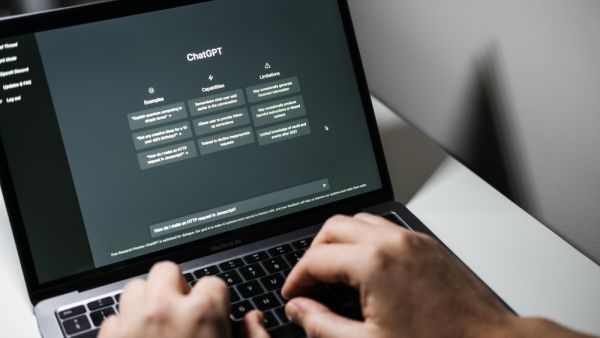ALBAWABA- Artificial Intelligence is rapidly changing the job market, with AI-powered chatbots, such as OpenAI's ChatGPT, leading the way.
These intelligent systems are able to handle a wide range of tasks, from customer service inquiries to data entry, and are increasingly being used to automate tasks previously performed by human workers.
In this article, we explore four jobs that are likely to be replaced by AI-powered chatbots in the near future, and what this means for the future of work.

Source: Shutterstock
The rise of AI-powered chatbots
The advent of AI-powered language models like ChatGPT has the potential to disrupt many industries and careers. As AI continues to advance, it is likely to automate a growing number of tasks that have traditionally been performed by humans. You might think that jobs or industries that involve repetitive or predictable tasks, such as data entry, customer service, and certain aspects of financial analysis, may be most at risk from the widespread adoption of AI-powered language models like ChatGPT.
The key factors that make ChatGPT a threat to certain careers are its ability to automate tasks that are repetitive or predictable, its ability to process large amounts of data quickly and accurately, and its ability to improve efficiency and reduce costs compared to traditional human labor. While this automation could lead to increased efficiency and cost savings, it could also result in job loss for workers who are unable to adapt to the new technological landscape. In particular, jobs that involve repetitive or predictable tasks, such as data entry or customer service, may be most at risk.
Yazan Noufal, co-founder of Dinasoor Tech - ديناصور تك, said: "Every industry we can think of could be impacted by the technologies of generative AI."
"However, the main jobs that would be impacted the most are content creation fields, media jobs in general, programmers, and legal assistants … but the list goes on. And if we look at it from a different perspective, OpenAI, the company behind ChatGPT now employs 375 skilled talents, so the demand for skilled scientists and developers in the AI field will increase significantly in the near future," he told Albawaba in an interview.
Nonetheless, not all jobs will be impacted equally by AI. Jobs that require critical thinking, creativity, and emotional intelligence are less likely to be automated.
To prepare for the future of work in an AI-driven world, workers may need to acquire new skills and training, and organizations may need to provide support for workers who are displaced by automation.
"The unprecedented 'intelligence' of ChatGPT in generating answers from simple queries, in a conversational form, makes its use so easy and time-saving, especially for drafting and planning ahead, along with its capabilities in fixing code errors and providing briefs of longer content," Noufal said.
"All of this is possible due to the language model that ChatGPT is built on, which is 'GPT-3.5' which also will be soon updated to 'GPT-4' making the advances in this technology continuous, fast, and impressive," he explained.
Governments and other organizations have a role to play in ensuring that workers are not left behind as AI continues to shape the job market and workforce of the future. This could include providing retraining programs and support for workers who are displaced by automation, as well as investing in AI research and development that focuses on creating new jobs and industries.
AI models like ChatGPT are likely to increase efficiency and reduce costs in the industries, where they are implemented, but they may also result in job loss for workers who are unable to adapt to the new technological landscape.
Workers in these industries may need to acquire new skills and training, such as coding or data analysis, to remain competitive in the job market.
Noufal industries should see AI as an "opportunity, not a threat."
"Like every groundbreaking tech such as the internet in the late 90s, some major shifts in the business models and the ways the companies operate should be taken into consideration," he said.
4 Jobs that may get affected by ChatGPT
- Customer Service Representatives: AI-powered chatbots, such as OpenAI's ChatGPT, are able to handle a large volume of customer inquiries and provide 24/7 support, reducing the need for human customer service representatives.
- Data Entry Clerks: ChatGPT's natural language processing capabilities allow it to accurately process and categorize large amounts of data, reducing the need for human data entry clerks.
- Telemarketers: ChatGPT can effectively carry out sales and marketing campaigns, freeing up human telemarketers to focus on more complex tasks that require human intervention.
- Translators: ChatGPT's multi-lingual capabilities allow it to accurately translate text and speech in real time, reducing the need for human translators in certain situations.
Noufal on preparing for an AI-Driven future of work: Navigating career concerns in an automated world
Workers can prepare for the changes that are likely to come as a result of the widespread adoption of AI in the workplace by acquiring new skills and training, such as coding or data analysis, that will help them remain competitive in the job market. Here are some tips from Noufal that helps workers anticipate the use and adoption of AI models by their employers:
- Upskilling and reskilling programs: Offer training and development programs to help employees acquire the skills needed for new or evolving job roles.
- Collaboration between humans and AI: Foster a work environment where human and AI capabilities complement each other, maximizing productivity and job satisfaction.
- Workforce planning and reassessment: Regularly assess the workforce needs and skills and plan accordingly to align with the changes brought by AI.
- Encouraging adaptability and lifelong learning: Encourage a culture of adaptability and continuous learning to help employees stay relevant and equipped for the future.
- Ethical use of AI: Ensure that AI is used in an ethical and transparent manner, protecting worker rights and minimizing negative impacts on employment.
- Diversifying the AI workforce: Promote diversity and inclusiveness in AI workforce development to ensure that the benefits of AI are shared across all segments of the population.
While it is true that these AI-powered chatbots are becoming increasingly capable and are able to automate many tasks previously performed by humans, it's important to note that they are not expected to completely replace human workers. Instead, AI technology is likely to change the nature of work and create new job opportunities in areas such as AI development and management. Additionally, many tasks that require human creativity, empathy, and critical thinking will likely remain the exclusive domain of human workers for the foreseeable future.







